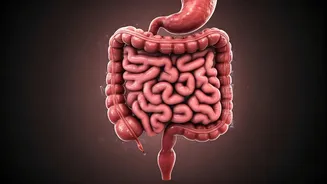Decoding Gut Health
Recent advancements in artificial intelligence and machine learning have equipped scientists with unprecedented tools to investigate the intricacies of
our internal ecosystems. A notable study, conducted at EPFL, employed these sophisticated technologies to examine the complex interplay between diet and gut health. This research aimed to uncover key factors influencing the composition and function of the gut microbiome, a community of microorganisms residing in the digestive tract. By analyzing vast datasets, the researchers were able to discern patterns and relationships previously hidden from view. The primary focus of the study was to identify dietary and behavioral elements that significantly impact the gut's well-being. This involved considering various aspects of eating habits and linking these to observable changes in the gut environment.
Diet's Crucial Role
The research firmly established the significant influence of nutritional quality on gut health. The types of food consumed were shown to directly affect the composition of the gut microbiome. Certain foods promote the growth of beneficial bacteria, fostering a balanced and thriving gut ecosystem. Conversely, other dietary choices can disrupt this balance, potentially leading to inflammation and other health issues. This highlights the importance of making informed dietary decisions. The findings underscore the need for a diet rich in diverse, whole foods, which provide essential nutrients and support the growth of a healthy microbial community. Avoiding processed foods, excessive sugars, and unhealthy fats can help mitigate adverse effects on gut health. The study reinforces the concept that the gut microbiome responds dynamically to the nutrients it receives.
Timing Your Meals
Beyond the 'what' of eating, the study emphasized the significance of the 'when.' The regularity with which individuals consume meals emerged as a key factor in maintaining optimal gut health. Irregular eating patterns, such as inconsistent meal times and frequent snacking, were linked to disruptions in the gut microbiome. These disruptions can negatively impact overall health. The body operates on a natural biological clock, and this clock influences various functions, including digestion. Maintaining a consistent eating schedule helps regulate this clock, promoting more efficient digestion and supporting a balanced gut environment. Regular meal times also assist in the production of digestive enzymes at the optimal times, allowing for proper nutrient absorption. Therefore, adopting a structured eating schedule can significantly contribute to a healthier gut.
Real-Time Data Power
The integration of AI and machine learning offered the researchers a unique advantage: the capacity to analyze real-time data from the human body. This enabled a deeper, more nuanced understanding of the effects of dietary choices and eating schedules. This technological edge allowed for the dynamic monitoring of changes within the gut microbiome in response to specific stimuli. The ability to monitor individuals in real-time provided critical insights into personalized dietary recommendations. The researchers were able to correlate specific eating patterns with observable alterations in gut health, creating the potential for customized dietary advice. The capacity for real-time analysis also helps accelerate the development of personalized health strategies. This innovative application underscores the transformative potential of advanced technologies in the field of nutritional science.
Future Implications
The insights gained from this study hold significant implications for future health initiatives. The discovery of diet's and timing's importance could lead to personalized dietary recommendations that go beyond broad guidelines. By combining AI with ongoing research, healthcare professionals can devise individualized approaches to improve gut health and overall well-being. This future also paves the way for new diagnostic tools. These tools could be used to predict how specific foods and eating patterns might influence a person's gut microbiome. This also means improved preventative measures can be taken to reduce the incidence of digestive disorders and other health problems. The research contributes to the growing body of knowledge on the complex interplay of food, eating habits, and gut health.












